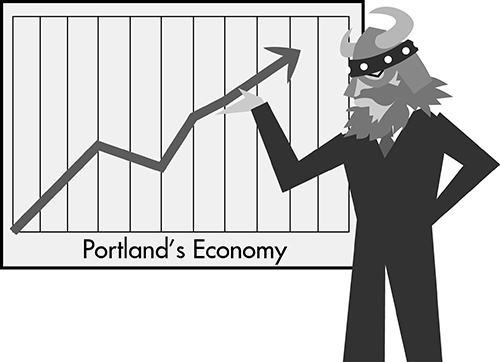Recently the Portland Business Journal published an article discussing Portland State’s emerging connection with the local economy—to the tune of a $1.4 billion annual impact. With PSU about to triple the size of the School of Business Administration (with the help of a recent $8 million grant), our impact on the local economy will only grow.
PSU’s emerging connection to Portland’s economy

Recently the Portland Business Journal published an article discussing Portland State’s emerging connection with the local economy—to the tune of a $1.4 billion annual impact. With PSU about to triple the size of the School of Business Administration (with the help of a recent $8 million grant), our impact on the local economy will only grow.
The increase in PSU’s influence will be substantial.
Without possessing the same levels of funding and facilities that the University of Oregon and Oregon State University have, it’s quite astonishing that PSU has become such a major player in the local economy.
One of the things the SBA has done to contribute to the growth of the local economy is require all business students to work with local businesses for their Senior Capstone requirement. In addition, our Athletic and Outdoor Industry Certificate program in the Center for Retail Leadership—one of the SBA’s new programs—has students working with local companies like Adidas, Columbia Sportswear and KEEN Footwear.
Programs like these help foster relationships between the university and local businesses.
The PSU Business Accelerator is another example of our roots in Portland’s economy. It houses more than 30 technology companies and partners with some major corporations, such as Intel, Oregon Health and Science University and Portland General Electric.
The progress the university has made and its economic impact is a testament to the influence of PSU President Wim Wiewel. Under his guidance, the SBA has grown to roughly 3,000 students and has become the largest business school in the state. It’s literally outgrown the building that houses it, forcing students to attend business classes all over campus. The recent anonymous philanthropic contribution will help triple the SBA building’s square footage.
PSU may not have the name recognition, reputation or allure that U of O and OSU have, but it has made use of an innovative curriculum and outside contributions, to get the university to where it is now.
While Wiewel has already done much to increase the university’s visibility, the impending growth of the business school, coupled with the Life Sciences Collaborative Building currently under construction on the South Waterfront, will certainly generate attraction for even more local economic players. Plus, we’ll attract talented students who may have otherwise considered attending OSU or U of O.
Being in Oregon’s largest city definitely gives us some advantages. There are plenty of potential business and corporate partners near the university. By continuing to build our brand, we’ll expand our community partnerships, thus increasing our impact on the local economy.
Other factors also play a role: The Stott Center renovation, with its proposed new use as a venue for symposiums, conferences, trade shows and the like, will draw more local businesses to campus. This, along with the business school’s renovation and the Business Accelerator, demonstrates PSU’s success in becoming increasingly connected to Portland’s economic viability. It means we’re a major player.
The greatest aspect of our economic connection is our philosophy when it comes to business. PSU has a reputation for being sustainability-focused and reducing our environmental footprint. As we partner with local businesses we can work under that ethos while propagating that ideology. In doing so we can influence the way Portland companies do business.
Others might conceive of our economic impact in terms of dollars and cents, but it’s more than that. PSU’s expanding focus on making “knowledge serve the city” is proof that we can influence Portland’s business community for the better.
And Portland residents will certainly appreciate that.






